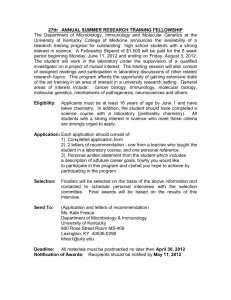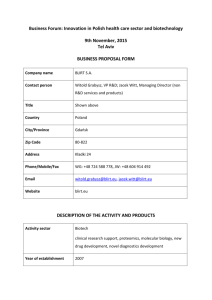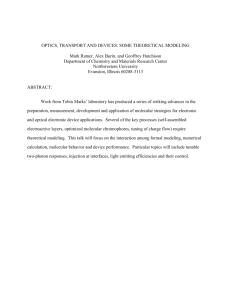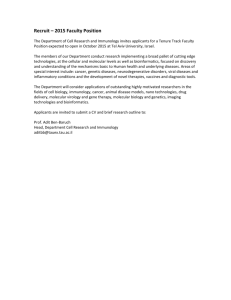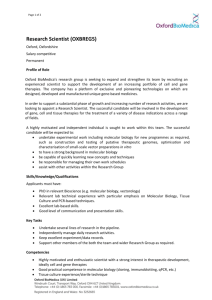Med Micro Projects v4
advertisement
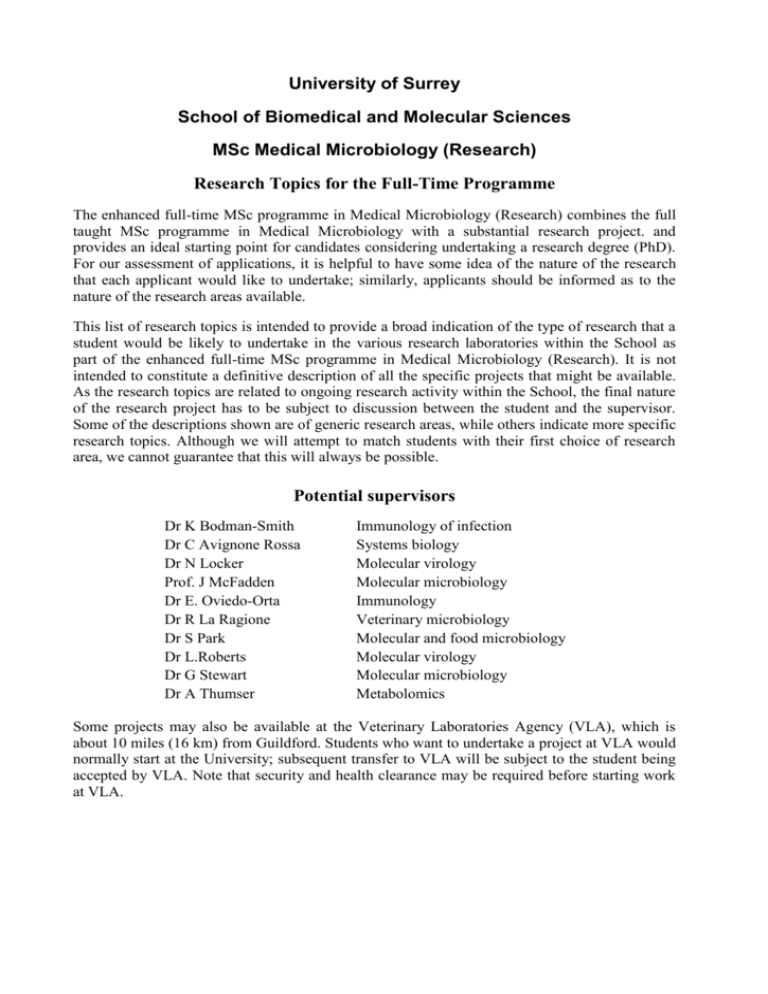
University of Surrey School of Biomedical and Molecular Sciences MSc Medical Microbiology (Research) Research Topics for the Full-Time Programme The enhanced full-time MSc programme in Medical Microbiology (Research) combines the full taught MSc programme in Medical Microbiology with a substantial research project. and provides an ideal starting point for candidates considering undertaking a research degree (PhD). For our assessment of applications, it is helpful to have some idea of the nature of the research that each applicant would like to undertake; similarly, applicants should be informed as to the nature of the research areas available. This list of research topics is intended to provide a broad indication of the type of research that a student would be likely to undertake in the various research laboratories within the School as part of the enhanced full-time MSc programme in Medical Microbiology (Research). It is not intended to constitute a definitive description of all the specific projects that might be available. As the research topics are related to ongoing research activity within the School, the final nature of the research project has to be subject to discussion between the student and the supervisor. Some of the descriptions shown are of generic research areas, while others indicate more specific research topics. Although we will attempt to match students with their first choice of research area, we cannot guarantee that this will always be possible. Potential supervisors Dr K Bodman-Smith Dr C Avignone Rossa Dr N Locker Prof. J McFadden Dr E. Oviedo-Orta Dr R La Ragione Dr S Park Dr L.Roberts Dr G Stewart Dr A Thumser Immunology of infection Systems biology Molecular virology Molecular microbiology Immunology Veterinary microbiology Molecular and food microbiology Molecular virology Molecular microbiology Metabolomics Some projects may also be available at the Veterinary Laboratories Agency (VLA), which is about 10 miles (16 km) from Guildford. Students who want to undertake a project at VLA would normally start at the University; subsequent transfer to VLA will be subject to the student being accepted by VLA. Note that security and health clearance may be required before starting work at VLA. Research topics Translation initiation on picornavirus RNA Supervisor : Lisa Roberts Picornaviruses (such as poliovirus) are able to switch off host cell (cap-dependent) protein synthesis during infection. However, the viral mRNAs continue to be translated by a capindependent mechanism termed internal initiation. This is directed by a complex structure called an Internal Ribosome Entry Site (IRES) element within the 5' untranslated region of the genome. We are studying the mechanism of action of these IRES elements from mammalian and insect picornaviruses. Studies are focused on identifying cellular proteins that interact with these elements and also the utility of these elements in viral expression vectors eg sindbis virus vectors. Techniques will include a wide range of molecular biology techniques including PCR, cloning, transcription and translation reactions, SDS-PAGE, Western blots, cell culture and RNA-protein interaction studies. Calicivirus/host interactions at the translational level Supervisor: Lisa Roberts We are currently studying calicivirus translation mechanisms and the effects of virus infection on host cell translation. i.e. the study of how viruses synthesise their own proteins, how this process is controlled and the effects of the virus on the host cell translation process. Caliciviruses are responsible for many significant diseases in man and animals. Human caliciviruses (noroviruses) are the major viral cause of projectile vomiting in adults, and the sudden emergence of virulent infections by rabbit haemorrhagic disease and European Brown Hare syndrome viruses led to the dramatic reductions in population. We have recently shown that these viruses use a novel mechanism of translation initiation on their mRNAs, using a viral protein that is attached to the viral mRNA as a “cap substitute”. We are now investigating this mechanism further and also studying the effect these viruses have on host cell protein synthesis. The project will involve a variety of molecular biological techniques, from cloning to in vitro translation studies, cell culture, western blot analysis , virus growth assays, RNA-protein interactions and protein-protein interactions. Identifying small molecule inhibitors of Hepatitis C virus (HCV) translation initiation Supervisor : Nicolas Locker, Lisa Roberts Hepatitis C virus (HCV) affects more than 40 million people worldwide, leading to chronic liver disease. The current treatment is only efficient in 50% of the patients, therefore new drugs are required. During HCV infection, the virus shuts down the host cell translation and hijacks the translational machinery via internal entry of ribosomes. This phenomenon relies on an RNA element termed an internal ribosome entry site (IRES) that direct the synthesis of the viral proteins. IRESes are therefore an attractive therapeutic target. This project will focus on using medium throughput screening techniques to identify inhibitors of HCV-mediated internal entry of ribosomes. Compounds from carefully chosen natural products libraries and a special “RNA-friendly molecules” library will be tested. Molecules with inhibitory effect will then be functionally characterized to decipher their mechanism, using in vitro reconstitution of translation initiation. Techniques will include a wide range of molecular biology techniques including PCR, cloning, transcription and translation reactions, SDS-PAGE, Western blots and RNA-protein interaction studies. 2 Systems biology of mycobacteria Supervisors:, Johnjoe McFadden The advent of systems biology has had a profound effect on bacteriological research, and especially in relation to the mycobacteria. Our laboratory built the first genome-scale model of the TB bacillus and has used the model to investigate aspects of growth and pathogenesis. This project will examine metabolism of the TB bacillus (using the BCG vaccine strain) grown on a range of substrates in vitro to investigate metabolic pathway utilization and gene expression. The model will be used to identify links between gene expression and metabolism that can be used to predict metabolism from transcriptome studies. Finally, the student will examine the transcriptome of M. tuberculosis isolated from macrophages to identify metabolic pathway utilization in vivo. The project will involve a wide range of molecular biology, microbiology and systems techniques and approaches. Mycobacterial mechanisms of pathogenesis Supervisor: Graham Stewart A central characteristic of all pathogenic mycobacteria is an ability to grow inside host macrophages. Even after induction of a cell mediated immune response, many mycobacterial infections will persist for the lifetime of the host. In this laboratory we are interested in exploiting the information encoded in the bacterial genome to inform how these bacteria perturb the host immune system. We utilise a variety of functional genomic technologies including microarray analysis of gene expression and microarray analysis of mutant phenotypes. These broad screens allow us to focus in on individual genes/products that require more detailed genetic and biochemical study. A project in this area could provide experience of a range of techniques within molecular biology, tissue culture and microscopy. Molecular biology of the meningococcus Supervisor: Johnjoe McFadden Our laboratory is attempting to identify new antigens for a novel vaccine to protect against meningococcal disease. The project will utilise a transposon library we have constructed to identify mutants that are defective in aspects of pathogenesis, such as adhesion to host cells or survival in serum. The defective gene will be cloned and sequenced and its role in the pathogenesis of the meningococcus will be elucidated. The project will involve a wide range of molecular biology and microbiology techniques and microbial pathogenesis. Immunology of the meningococcus Supervisor: Kikki Bodman-Smith The mortality and morbidity associated with meningococcal disease is primarily due to overactivation of the host inflammatory response in response to the pathogen (Neisseria meningitidis). The aim of our research is to gain a better understating of this process. The specific aim of this project is to investigate how the binding of C-Reactive protein (a host inflammatory mediator) to meningococcal cells affects the pathogen’s interaction with macrophages and dendritic cells (key immune cells and mediators of the inflammatory response). 3 The molecular biology of Campylobacter jejuni Supervisor: Simon F. Park Campylobacter jejuni is considered to be amongst the most ubiquitous pathogens known to man and today as we start a new millennium this organism is recognised as the leading cause of bacterial foodborne diarrhoeal disease throughout the developed word. The completion of the sequencing project for the entire genome of Campylobacter jejuni has led to the generation of an enormous gene and protein database. In essence this database represents the Curriculum vitae of the organism, and as such, it contains all of the information necessary for it to cause disease and to exist. A research project in this area would seek to decode aspects of this information and would provide training in the use of a wide range of molecular biology techniques. Assessment of probiotics intake on the development of cardiovascular disease. Supervisors: Dr Ernesto Oviedo-Orta, Dr Alexandra Bermudez-Fajardo, Dr Roberto La Ragione Recent human clinical trials have demonstrated that the regular intake of probiotics (popularly known as friendly bacteria) can significantly reduce plasma cholesterol levels and blood pressure, suggesting a potential beneficial effect of a probiotic-based diet on cardiovascular disease. This project will further investigate these claims by assessing the effects of probiotics on the development of atherosclerotic plaques using an experimental animal model of the disease. The project will provide training in bacteriological, immuno-histochemistry and immunological techniques. Use of probiotics to modulate immune responses linked to atherosclerotic plaque development. Supervisors: Ernesto Oviedo-Orta, Alexandra Bermudez-Fajardo, Roberto La Ragione Probiotics are live bacterial or yeast known for their beneficial effects to the host. Basillus spp. are amongst the most commonly used probiotic bacterial spp. They have been previously modified and used as carriers in vaccine preparations. This project will assess the affect of probiotics used as antigen delivery systems on the modification of immune responses responsible for the development of atherosclerotic plaques. The project will provide training in bacteriological, molecular biology, immuno-histochemistry and immunological techniques. Development of novel recombinant adenovirus vaccine vectors to treat atherosclerotic plaque development Supervisors: Ernesto Oviedo-Orta, Alexandra Bermudez-Fajardo, Lisa Roberts Atherosclerosis is a chronic inflammatory disease in which T and B cells play a crucial role. Immunotherapy through vaccination has been proposed as an effective strategy to combat atherosclerotic plaque development. We have recently identified a new set of antigens with antiinflammatory activity that specifically target T-cell-mediated immune responses. This project aims to generate a set of recombinant viral (adenovirus) vectors bearing these antigens with the purpose of using them as vaccine preparations to reduce or halt atherosclerotic plaque development. Training will be given in cell culture, PCR, Western blot, molecular biology. 4 Immunomodulation of atherosclerosis by Chlamydia pneumoniae-derived antigens. Supervisors: Ernesto Oviedo-Orta, Alexandra Bermudez-Fajardo Atherosclerosis is the main underlying cause of cardiovascular disease. The chronic inflammatory process associated with atherosclerosis is known to be triggered by numerous antigens including oxidised low density lipoproteins (ox-LDL), heat shock proteins (HSP), viral and bacterial-derived proteins (i.e, Chlamydia pneumoniae). A strong correlation has been shown between serum levels of antibodies against bacteria and the occurrence of heart attacks. The aim of this study is to investigate how C. pneumoniae-derived proteins affect the development of atherosclerosis by interfering with the immune system. This project will provide training in molecular and cell biology, immunology and microbial pathogenesis. Evaluation of immune responses against mycobacterium expression vectors bearing atheroprotective antigens. Supervisor: Ernesto Oviedo-Orta, Alexandra Bermudez-Fajardo, Graham Stewart Mycobacterium expression vectors (BCG, M. vaccae, etc) have been used to express a wide range of antigens and used for vaccine research and development purposes. We have recently developed new mycobacterium-based expression vectors bearing athero-protective antigens. This project aims to evaluate the immune response against these vectors and the effect of the immunity produced on atherosclerotic plaque development using a experimental animal model of the disease. The project will provide training in bacteriological, immuno-histochemistry and immunological techniques (flow cytometry and ELISA). Effect of viral infection on the metabolic activity of mammalian cells: A metabolomics approach Supervisors: Alfred Thumser, Lisa Roberts, Claudio Avignone Rossa Hypothesis: Viral replication depends on energy and carbon skeleton precursors for synthesis of viral macromolecules, which must be obtained from the metabolic processes of the infected cell. This will certainly result in changes in the activity of primary metabolic pathways (such as glycolysis, TCA cycle, etc), which will result in an impairment of cellular homeostatic processes and subsequent cell death. The hypothesis to be tested is that the metabolic activity of mammalian cells subjected to sublethal viral infection will show changes in the pool of small molecular weight intracellular metabolites, reflecting the changes in the metabolic patterns of the infected cells. Aim: To detect the metabolic pathways disrupted by sub-lethal viral infection, using LC-MS techniques and multi-variate data analysis Proposed model virus: Murine norovirus Model cell model system: RAW 246.7 cells (macrophages) Objectives: Set up of experimental system (cell culture, sampling, sample treatment) Analysis of cell viability vs. viral titre (MTT assays and TCID50) Analysis of the macromolecular composition of infected and non-infected cells LC-MS analysis of extra-cellular and intra-cellular metabolites, using a non-targeted metabolomics approach (top-down approach) Biolog analysis of cell metabolic activity (infected and non-infected cells) Set up of specific assays, e.g. ATP, NADH, NADPH, GSH 5 Projects at the Veterinary Laboratories Agency (VLA) The use of 3D cell culture and phenotypic arrays to study the efficacy of probiotics against multi-drug resistant porcine Salmonella Typhimurium DT104 Location: Dept. Food and Environmental Safety, VLA. Supervisor: Roberto Marcello La Ragione Salmonella Typhimurium is an important zoonotic pathogen causing clinical disease in both humans and animals. Of particular concern is the emergence of multi-drug resistant strains in farm animal species where S. Typhimurium already has a significant economic impact. Pentaresistant (resistant to ampicillin, chloramphenicol, streptomycin, sulphonamides and tetracyclines, R-type ACSSuT) S. Typhimurium DT104 strains have emerged as a specific problem in the pig sector and so alternative intervention strategies are urgently required. Probiotics have been shown to be effective in reducing Salmonella colonisation in a number of farm animal species. One of the principal values for probiotic use in agriculture is to reduce the incidence of gastrointestinal infection and thereby improve not only the health of the animal but other factors such as yield, carcass quality, etc. There are many candidate and commercial probiotics available and thus there is a need to determine the most efficacious strains for use. This project aims to screen common probiotic species for their inhibitory capacity against multi-resistant porcine S. Typhimurium. To do this a novel 3D cell culture system will be used together with a high throughput metabolic screening system (Biolog). The project will involve a variety of microbiological, immunology, biochemistry, imaging and cell culture techniques together with training in data analysis. Host cell responses to lyssavirus infection in an ovine model. Supervisors: Sharon Brookes & Tony Fooks (VLA). The European Bat Lyssaviruses (EBLV 1 & 2) are capable of causing ‘bat rabies’ in their natural hosts; Serotine, Daubenton’s and Pond Bats. ‘Spill-over’ infections also occur in man (4 cases) and other terrestrial mammals (4 sheep, and 1 stone marten). Our group has been studying the pathogenesis of EBLVs in both ‘severe’ and peripheral infection models in sheep to determine the clinical signs, virus replication and pathology of disease. The project would examine innate and adaptive host immune response markers from a variety of tissues using molecular biology (PCR and qPCR) and possibly virus neutralising antibody using live virus/cell assays. The latter would be conducted in the Rabies High Security Unit and would require the student to be vaccinated against Rabies (provided) and be CTC security cleared (10 weeks plus). CRC clearance (6-8 weeks) is also required to work in the routine laboratories, we envisage that a suitable candidate would begin the project in this area and move on to the RHSU work once clearance and vaccination had been completed. CRC – Criminal record clearance CTC – Counter Terrorist clearance Other projects at VLA Other projects may be available at VLA, in virology or other units. If you have a specific interest in any area of veterinary microbiology, we can ask VLA if they can take a student to work in that area. 6
